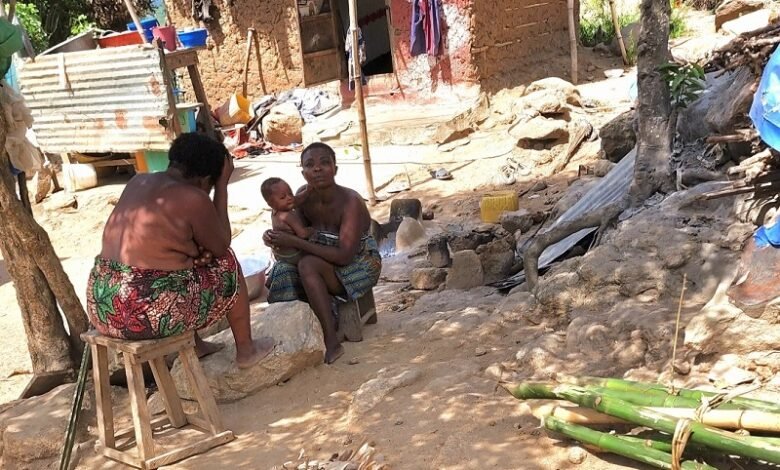Unspoken struggles: Shedding light on breast cancer awareness and treatment in Afadjator

Olivia Frimpong is a nursing mother who has been living alone with her grandmother at Afadjator in the Central Region of Ghana, since her mother died of breast cancer nine years ago.
She says her mother, fondly called Manye found a lump in her breast more then two years before her breast turned sore, forcing the family to take her to the Bawjiase Polyclinic located quite far from their village which has no clinic.
The Bawjiase Polyclinic which serves 16 communities with a population of more than 60,000, offers no Oncology services so cases suspected to be cancer are mostly refered from the facility to the Korle Bu Teaching Hospital in Accra.
Stigmatisation against breast diseases like breast cancer and the lack of access to well-resourced health facilities in rural Ghana remains a major contributory factor to the high number of breast cancer related deaths recorded in Ghana annually.
Olivia says her late mother, died a painful death as she suffered excruciating pain day and night which was managed with over the counter pain killers until she finally gave up the ghost.
“At some point we wished she would die because we just could not stand seeing her suffer that much. Her breast looked like it was rotting away, we could not afford to take her to the Korle Bu Teaching Hospital where she was refered to for treatment so we just kept her at home and invited a herbalist to come and treat her but that did not work. We could not even find a nearby clinic here in Afadjator where we could take her to for the dressing of her wound,” she says.
More than 4000 women are diagnosed of breast cancer annually in Ghana and more than 50 per cent of the number succumb to the disease.
Health experts are worried that if stringent measures are not put in place to salvage the situation the number would rise.
Breast cancer survivor and advocate, Mrs Ramatu Sumani is of the view that the lack of access to proper healthcare in rural Ghana is making the problem worst because rural dwellers have to travel long distances before they can get healthcare from a clinic or even a Community Health Planning and Services (CHPS) compound.
This she says discourages rural women from visiting hospitals for services like breast examination, which are sometimes offered for free.
Awareness creation, Mrs Sumani said is also a major challenge because community health nurses do not even get the needed resources to enable them visit remote areas for breast cancer campaigns.
Olivia is not the only woman worried about the lack of access to breast care services in her community, Mary Ansah is equally saddened by the situation because her 14-year old child’s left breast has grown bigger than the right one.
She says after reporting the problem to healthcare givers at the Bawjiase Polyclinic the abnormality in her teenage daughter’s breast remains the same.
She hopes to visit a higher health facility in the Greater Accra Region once she has the funds.
For Madam Enyonam Azaglo, breast cancer will always remain a “spiritual” disease because her family has the belief that such a chronic disease is a generational curse.
She says anyone in her family who died of any form of breast disease was buried the same day because such a person is seen as a “bad omen.”
These kinds of beliefs are one of the reasons why breast cancer advocate, Mrs Sumani, is seriously advocating for increased awareness about breast cancer in rural Ghana to help dispel misconceptions surrounding breast cancer.
She says “It is sad that people still die of breast cancer in Ghana out of ignorance. Others too for the fear of stigmatisation do not talk about breast health or even attempt going to the hospital to report any abnormality they find in their breasts.”
“There is more to be done to change this narrative.”
The Non-Communicable Disease Control Programme Officer of the Ghana Health Service, Dr Efua Commey, in an interview indicates that her outfit occasionally, organises breast cancer awareness programmes in selected communities in the country, especially in the month of October each year which has been set aside globally to increase awareness about the disease.
She bemoans the devastating nature of breast cancer and adds that the government is doing its best to ensure access to healthcare in every part of Ghana.
An official at the Awutu Senya Health Directorate who pleaded anonymity says there is no health facility in the whole district and nearby Municipalities with health facilities offering any form of Oncology service therefore any patient who needs such services is mostly refered to the Korle Bu Teaching Hospital which is located in the Greater Accra Region.
Many of the people living in the surrounding villages he says cannot even afford transportation to the district health center let alone getting transport to Korle Bu for further investigations into the cause of their breast diseases and affording treatment.
“Several calls to bring such services closer to the rural dwellers have fallen on deaf ears. Authorities always give excuses that there is no money,” he laments.
The people of Afadjator are calling on authorities to as a matter of urgency prioritise their wellbeing by making sure a well resourced health facility is built for them and awareness about chronic diseases like breast cancer is increased to save the lives of community members especially women.
Olivia wishes that no other member of her family will die of breast cancer again.
She is also appealing to benevolent individuals and organisations to help salvage the situation at Afadjator.
BY RAISSA SAMBOU


